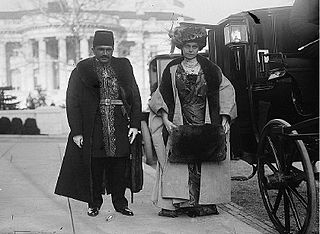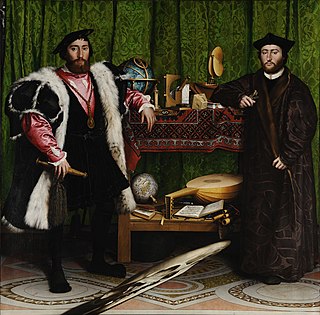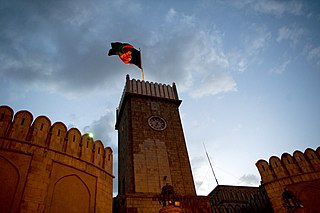
A chargé d'affaires, often shortened to chargé (French) and sometimes to charge-D, is a diplomat who heads an embassy in the absence of the ambassador. The term is French for "charged with matters". A female diplomat may be designated a chargée d'affaires, following French declension.
Diplomatic rank is a system of professional and social rank used in the world of diplomacy and international relations. A diplomat's rank determines many ceremonial details, such as the order of precedence at official processions, table seatings at state dinners, the person to whom diplomatic credentials should be presented, and the title by which the diplomat should be addressed.

Diplomatic correspondence is correspondence between one state and another, usually – though not exclusively – of a formal character. It follows several widely observed customs and style in composition, substance, presentation, and delivery and can generally be categorized into letters and notes.

A courtesy call is a call or visit made out of politeness.

The United States recognized the Republic of Texas, created by a new constitution on March 2, 1836, as a new independent nation and commissioned its first representative, Alcee La Branche as the chargé d'affaires in 1837. The U.S. never sent a full minister to Texas, but a series of chargés represented the government in Austin until Texas joined the Union.

The nation of Yugoslavia was formed on December 1, 1918 as a result of the realignment of nations and national boundaries in Europe in the aftermath of World War I. The nation was first named the Kingdom of Serbs, Croats and Slovenes and was renamed the Kingdom of Yugoslavia in 1929. The kingdom occupied the area in the Balkans comprising the present-day states of Bosnia and Herzegovina, Serbia, Montenegro, Republic of Macedonia, and most of present-day Slovenia and Croatia. The United States recognized the newly formed nation and commissioned its first envoy to the kingdom on July 17, 1919. Previously the USA had had an envoy extraordinary and minister plenipotentiary who was commissioned to Romania, Bulgaria, and Serbia while resident in Bucharest, Romania. Towards the end of the 1930s, the diplomatic relations between Belgrade and Washington were raised from ministerial to the ambassadorial level.
In the Commonwealth of Nations, a high commissioner is the senior diplomat in charge of the diplomatic mission of one Commonwealth government to another. Instead of an embassy, the diplomatic mission is generally called a high commission.
An envoy extraordinary and minister plenipotentiary, usually known as a minister, was a diplomatic head of mission who was ranked below ambassador. A diplomatic mission headed by an envoy was known as a legation rather than an embassy. Under the system of diplomatic ranks established by the Congress of Vienna (1815), an envoy was a diplomat of the second class who had plenipotentiary powers, i.e., full authority to represent the government. However, envoys did not serve as the personal representative of their country's head of state. Until the 20th century, most diplomatic missions were legations headed by diplomats of the envoy rank. Ambassadors were only exchanged between great powers, close allies, and related monarchies.

General Freddy José Padilla de León is a retired General of the Army of Colombia and currently serves as Ambassador of Colombia to Austria and Permanent Representative to the United Nations Office at Vienna. Prior to this diplomatic post General Padilla served as the General Commander of the Armed Forces of Colombia from 2006 to 2010, and as such assumed the Ministry of National Defence ad interim in 2009.










